| Season Start: | 07 September 1987 | | Season End: | 07 December 1987 | | Season Length: | 14 Weeks | | Writers: | Ian Briggs, Malcolm Kohll, Pip and Jane Baker and Stephen Wyatt | | Directors: | Andrew Morgan, Chris Clough and Nicholas Mallett | | Producer: | John Nathan-Turner | | Script Editor: | Andrew Cartmel | | Visual Effects: | Andy McVean, Colin Mapson and Simon Taylor | | Title Sequence: | Oliver Elmes | | Title Music: | Ron Grainer and the BBC Radiophonic Workshop. Arranged by Keff McCulloch |
|
Incarnation of the Doctor: |
The Seventh Doctor (Newly Regenerated)
|
|
Other Incarnations of the Doctor: |
The Sixth Doctor (Regenerates) |
| Number of
Companions: |
2 |
| The
Companions: |
Melanie Bush (Departs) and Ace (Joins)
|
| Number of
Acquaintances: |
1
|
| The
Acquaintances: |
Sabalom Glitz (Rejoins and Departs)
|
| Number of
Stories: |
4
|
| Number of
Incomplete/Missing Stories: |
0
|
| Number of
Episodes: |
14
|
| Number of
Incomplete/Missing Episodes: |
0
|
| Percentages: |
| Full Stories Held | 100% | | Episodes Held | 100% |
|
| Doctor Who Magazine Poll (1998) | | | Doctor Who Magazine Poll (2009) | | | Doctor Who Magazine Poll (2014) | |
|
 'Yes, that's right, you're going. You've been gone for ages. You're already gone. You're still here. You've just arrived. I haven't even met you yet. It all depends on who you are and how you look at it. Strange business, time.' 'Yes, that's right, you're going. You've been gone for ages. You're already gone. You're still here. You've just arrived. I haven't even met you yet. It all depends on who you are and how you look at it. Strange business, time.'
The Doctor
(Dragonfire) |
|
|
|
|
| |
 |
| Regeneration |
|
 After the disruptions witnessed during the previous two seasons, where there was a very credible possibility that the show would be cancelled completely, Doctor Who returned to our television screens, in September 1987, for Season Twenty Four. After the disruptions witnessed during the previous two seasons, where there was a very credible possibility that the show would be cancelled completely, Doctor Who returned to our television screens, in September 1987, for Season Twenty Four.
 This season though was very different from the previous season as the show returned to its standard format of separate self contained stories rather than the season long storyline that had been the fourteen episodes that had made up The Trial of a Time Lord season. But even though the show was back on our screens it was as a former shadow of itself and major changes, both in front of the camera and behind, had taken place since Season Twenty Three had ended. This season though was very different from the previous season as the show returned to its standard format of separate self contained stories rather than the season long storyline that had been the fourteen episodes that had made up The Trial of a Time Lord season. But even though the show was back on our screens it was as a former shadow of itself and major changes, both in front of the camera and behind, had taken place since Season Twenty Three had ended.
 The biggest, and most obvious change, was that Colin Baker was no longer playing the part of The Doctor and that Sylvester McCoy had taken over the role – so ending the Sixth Doctor’s era and beginning the Seventh Doctor’s era. For many fans this was a very unpopular change and one that neither Colin Baker or John Nathan Turner were happy about. The only good thing was that Doctor Who was still being made. The biggest, and most obvious change, was that Colin Baker was no longer playing the part of The Doctor and that Sylvester McCoy had taken over the role – so ending the Sixth Doctor’s era and beginning the Seventh Doctor’s era. For many fans this was a very unpopular change and one that neither Colin Baker or John Nathan Turner were happy about. The only good thing was that Doctor Who was still being made.
 Thankfully BBC1 Controller Michael Grade had decided to renew Doctor Who for another year, but it was only on the condition that Colin Baker be replaced as the show’s star, despite objections made by Producer John Nathan-Turner. In return for John Nathan-Turner having to inform Colin Baker, that his contract would not be renewed for Season Twenty Four, John Nathan-Turner believed that he would be assigned to a new programme and Doctor Who would have a change of producer for the first time in seven years. But after returning from his winter vacation, John Nathan-Turner was informed that this agreement had been rescinded and that he would remain on Doctor Who for at least one more season. With just a few months to go before the start of production of this season John Nathan-Turner had little time to find a new star, a new Script Editor, and to obtain a series of stories. Thankfully BBC1 Controller Michael Grade had decided to renew Doctor Who for another year, but it was only on the condition that Colin Baker be replaced as the show’s star, despite objections made by Producer John Nathan-Turner. In return for John Nathan-Turner having to inform Colin Baker, that his contract would not be renewed for Season Twenty Four, John Nathan-Turner believed that he would be assigned to a new programme and Doctor Who would have a change of producer for the first time in seven years. But after returning from his winter vacation, John Nathan-Turner was informed that this agreement had been rescinded and that he would remain on Doctor Who for at least one more season. With just a few months to go before the start of production of this season John Nathan-Turner had little time to find a new star, a new Script Editor, and to obtain a series of stories.
 For the first story, "Time and The Rani", John Nathan-Turner approached husband and wife writing team Pip and Jane Baker who had demonstrated the previous year that they could deliver scripts quickly. For the final three stories John Nathan-Turner approached the BBC’s Script Unit and commissioned the remaining stories from there – these being Stephen Wyatt (who wrote "Paradise Towers"), Malcolm Kohll (who wrote "Delta and the Bannermen") and Ian Briggs (who wrote "Dragonfire"). For the first story, "Time and The Rani", John Nathan-Turner approached husband and wife writing team Pip and Jane Baker who had demonstrated the previous year that they could deliver scripts quickly. For the final three stories John Nathan-Turner approached the BBC’s Script Unit and commissioned the remaining stories from there – these being Stephen Wyatt (who wrote "Paradise Towers"), Malcolm Kohll (who wrote "Delta and the Bannermen") and Ian Briggs (who wrote "Dragonfire").
 The biggest change behind the camera was a replacement finally being found for Eric Saward who had resigned, as the show’s Script Editor, half way through the previous season. His replacement, Andrew Cartmel, took over as Script Editor after the production of the first story of this season had already begun. Andrew Cartmel and John Nathan-Turner would remain in place throughout the remaining three seasons of the original run of the show, so bring some stability back to the show. The biggest change behind the camera was a replacement finally being found for Eric Saward who had resigned, as the show’s Script Editor, half way through the previous season. His replacement, Andrew Cartmel, took over as Script Editor after the production of the first story of this season had already begun. Andrew Cartmel and John Nathan-Turner would remain in place throughout the remaining three seasons of the original run of the show, so bring some stability back to the show.
 With the news of Colin Baker’s firing revealed to the press in early December 1986, fans were once again speculating as to the identity of the next Doctor. However, when Sylvester McCoy stepped into the role of The Doctor, it wasn’t without its controversy. Although Colin Baker was unpopular with BBC executives, John Nathan-Turner had managed to convince Michael Grade to let Colin Baker return for the first four-part story of this season, to tie up loose ends and to facilitate the regeneration into the new Doctor. Colin Baker understandable refused having decided it was best, from both a personal and a professional perspective, to make a clean break from Doctor Who. And so this season started, in "Time and The Rani", with one of the weakest regeneration sequences. Because Colin Baker had refused to be part of the show this ‘regeneration’ sequence was achieved by Sylvester McCoy wearing the Sixth Doctor’s clothes, a wig - to mimic Colin Baker’s hair - and a computer effect to hide his face. This resulted in making Sylvester McCoy the only actor to play two different incarnations of The Doctor. With the news of Colin Baker’s firing revealed to the press in early December 1986, fans were once again speculating as to the identity of the next Doctor. However, when Sylvester McCoy stepped into the role of The Doctor, it wasn’t without its controversy. Although Colin Baker was unpopular with BBC executives, John Nathan-Turner had managed to convince Michael Grade to let Colin Baker return for the first four-part story of this season, to tie up loose ends and to facilitate the regeneration into the new Doctor. Colin Baker understandable refused having decided it was best, from both a personal and a professional perspective, to make a clean break from Doctor Who. And so this season started, in "Time and The Rani", with one of the weakest regeneration sequences. Because Colin Baker had refused to be part of the show this ‘regeneration’ sequence was achieved by Sylvester McCoy wearing the Sixth Doctor’s clothes, a wig - to mimic Colin Baker’s hair - and a computer effect to hide his face. This resulted in making Sylvester McCoy the only actor to play two different incarnations of The Doctor.
 In the final story of the season we witnessed the departure of Bonnie Langford, who was unpopular with most fans as companion Melanie Bush, and the arrival of Sophie Aldred playing the part of Ace - The Doctor’s new travelling companion. Sophie Aldred had mainly appeared in cabaret and children’s theatre when she auditioned for the role of Ray in "Delta and the Bannermen". Instead, she was selected as Ace, and informed of the possibility that she might become a companion. Although the character of Ace was sixteen, actress Sophie Aldred was in fact nearly ten years older at the time she started playing this part. In the final story of the season we witnessed the departure of Bonnie Langford, who was unpopular with most fans as companion Melanie Bush, and the arrival of Sophie Aldred playing the part of Ace - The Doctor’s new travelling companion. Sophie Aldred had mainly appeared in cabaret and children’s theatre when she auditioned for the role of Ray in "Delta and the Bannermen". Instead, she was selected as Ace, and informed of the possibility that she might become a companion. Although the character of Ace was sixteen, actress Sophie Aldred was in fact nearly ten years older at the time she started playing this part.
 As for Bonnie Langford, after leaving the show she attempted to resume her theatrical career, only to find herself mired by typecasting. She therefore decided to put her career on hold before subsequently returning to the stage. She reprised her role as Melanie in the Thirtieth-Anniversary Children In Need special "Dimensions in Time", in 1993, and in a number of for Big Finish Productions’ Doctor Who audio stories starting with "The Fires of Vulcan" in September 2000. As for Bonnie Langford, after leaving the show she attempted to resume her theatrical career, only to find herself mired by typecasting. She therefore decided to put her career on hold before subsequently returning to the stage. She reprised her role as Melanie in the Thirtieth-Anniversary Children In Need special "Dimensions in Time", in 1993, and in a number of for Big Finish Productions’ Doctor Who audio stories starting with "The Fires of Vulcan" in September 2000.
 As well as containing the final appearance of companion Melanie this season also included the final appearance of The Rani and Sabalom Glitz. The Rani had previously appeared in the 1985 Sixth Doctor story "The Mark of The Rani". While Glitz had first been seen in the 1986 Sixth Doctor story "The Mysterious Planet" before he returned in the "The Ultimate Foe" in the same season. Apart from The Doctor and Melanie these were the only two characters that had made a previous appearance in the show. And for the second season in a row neither the Daleks or the Cybermen made an appearance. As well as containing the final appearance of companion Melanie this season also included the final appearance of The Rani and Sabalom Glitz. The Rani had previously appeared in the 1985 Sixth Doctor story "The Mark of The Rani". While Glitz had first been seen in the 1986 Sixth Doctor story "The Mysterious Planet" before he returned in the "The Ultimate Foe" in the same season. Apart from The Doctor and Melanie these were the only two characters that had made a previous appearance in the show. And for the second season in a row neither the Daleks or the Cybermen made an appearance.
 This season consisted of four stories and fourteen episodes of twenty-five minutes each. This season was made up of two 4-episode stories followed by two 3-episode stories – a format that would be retained for the remainder of the original run of the show. "Delta and the Bannermen" was the first story with three 25-minute episodes since the 1964 First Doctor story "Planet of Giants". This season consisted of four stories and fourteen episodes of twenty-five minutes each. This season was made up of two 4-episode stories followed by two 3-episode stories – a format that would be retained for the remainder of the original run of the show. "Delta and the Bannermen" was the first story with three 25-minute episodes since the 1964 First Doctor story "Planet of Giants".
 After being shown twice mid-weekday, during the Fifth Doctor’s era, the show returned to its traditional Saturday evening slot for Season Twenty Two and Season Twenty Three. But with Season Twenty Four the show once again returned to a weekday slot – but this time once a week and on a Monday. Partly due to the weak stories and the fact that the show was now being broadcast later in the evening (by nearly two hours), which brought the show into direct competition with the ITV soap Coronation Street, the ratings did not improve. This season only reached an average of 4.9 million viewers. This was only a fraction higher than the previous season. Since this season was broadcast it has been voted twice, in the Doctor Who Magazine polls, as the least liked. Both times being voted last. "Time and The Rani" has been in the bottom five and all four stories were in the bottom twenty in the 2009 poll. After being shown twice mid-weekday, during the Fifth Doctor’s era, the show returned to its traditional Saturday evening slot for Season Twenty Two and Season Twenty Three. But with Season Twenty Four the show once again returned to a weekday slot – but this time once a week and on a Monday. Partly due to the weak stories and the fact that the show was now being broadcast later in the evening (by nearly two hours), which brought the show into direct competition with the ITV soap Coronation Street, the ratings did not improve. This season only reached an average of 4.9 million viewers. This was only a fraction higher than the previous season. Since this season was broadcast it has been voted twice, in the Doctor Who Magazine polls, as the least liked. Both times being voted last. "Time and The Rani" has been in the bottom five and all four stories were in the bottom twenty in the 2009 poll.
 Even though John Nathan-Turner’s request to be moved off of Doctor Who, to another show, was once again declined by his BBC superiors, with Andrew Cartmel now fully ensconced in his role as Script Editor and Sylvester McCoy finally having the opportunity to reflect on his portrayal of The Doctor after his last-minute casting, meant Doctor Who was about to enjoy a stability it had not known for five years. Together, the three men could begin planning a new direction for the show. Even though John Nathan-Turner’s request to be moved off of Doctor Who, to another show, was once again declined by his BBC superiors, with Andrew Cartmel now fully ensconced in his role as Script Editor and Sylvester McCoy finally having the opportunity to reflect on his portrayal of The Doctor after his last-minute casting, meant Doctor Who was about to enjoy a stability it had not known for five years. Together, the three men could begin planning a new direction for the show.
 By the time this season ended it seemed that recent events, that had plagued most of the Sixth Doctor's era, were over and that they had just been a minor hic-cup in the normal running of the show. By the time this season ended it seemed that recent events, that had plagued most of the Sixth Doctor's era, were over and that they had just been a minor hic-cup in the normal running of the show.
 So despite the rather lacklustre stories and that the seasons were now reduced to just four stories, and only fourteen episodes, it looked as if the show was back on course. With a new actor in the lead role, and with a new companion at his side, the future of the show was finally looking as it would continue into its silver anniversary season and beyond - for now at least. So despite the rather lacklustre stories and that the seasons were now reduced to just four stories, and only fourteen episodes, it looked as if the show was back on course. With a new actor in the lead role, and with a new companion at his side, the future of the show was finally looking as it would continue into its silver anniversary season and beyond - for now at least.
|
|
|
 |
| Melanie and The Doctor |
|
 In previous seasons, that included a change of incarnation of The Doctor, it is the regeneration sequence that has been the thing to watch out for. Ever since the very first regeneration from the First Doctor to the Second Doctor, in the 1966 story "The Tenth Planet", the regeneration sequences have got better and better. In previous seasons, that included a change of incarnation of The Doctor, it is the regeneration sequence that has been the thing to watch out for. Ever since the very first regeneration from the First Doctor to the Second Doctor, in the 1966 story "The Tenth Planet", the regeneration sequences have got better and better.
 But unfortunately, due to the way that Colin Baker, who played the Sixth Doctor, had left the show (having been sacked by the BBC Management) The Doctor’s sixth regeneration sequence became a very weak and hurried affair. Forced into having to rely on Sylvester McCoy disguised as the Sixth Doctor this regeneration was supposedly triggered when The Doctor is mortally wounded, when The Rani captures the TARDIS, so causing him to regenerate for a sixth time. But unfortunately, due to the way that Colin Baker, who played the Sixth Doctor, had left the show (having been sacked by the BBC Management) The Doctor’s sixth regeneration sequence became a very weak and hurried affair. Forced into having to rely on Sylvester McCoy disguised as the Sixth Doctor this regeneration was supposedly triggered when The Doctor is mortally wounded, when The Rani captures the TARDIS, so causing him to regenerate for a sixth time.
 As has become the tradition with a new incarnation of The Doctor this season, being the first for the Seventh Doctor, came with a new logo and version of the theme tune. For the new title sequence John Nathan-Turner approached Oliver Elmes of the BBC’s graphics department. For the title sequence he devised a sequence which moved away from the ‘starfield’ motif that had been introduced in 1980. With the assistance of CAL Video, Oliver Elmes devised his new sequence that included an image of the Seventh Doctor starting with a scowl, then winking before ending with him smiling. This was the first completely new logo and title sequence since Season Eighteen and marked the first time the show’s titles were created with a computer and the first with an animated image of The Doctor’s face. As has become the tradition with a new incarnation of The Doctor this season, being the first for the Seventh Doctor, came with a new logo and version of the theme tune. For the new title sequence John Nathan-Turner approached Oliver Elmes of the BBC’s graphics department. For the title sequence he devised a sequence which moved away from the ‘starfield’ motif that had been introduced in 1980. With the assistance of CAL Video, Oliver Elmes devised his new sequence that included an image of the Seventh Doctor starting with a scowl, then winking before ending with him smiling. This was the first completely new logo and title sequence since Season Eighteen and marked the first time the show’s titles were created with a computer and the first with an animated image of The Doctor’s face.
 A new arrangement of Ron Grainer’s theme music was created partly because the new title sequence was considerably longer than the previous version, and partly because Dominic Glynn’s Season Twenty Three arrangement had not been particularly well-received. This new arrangement was created by Keff McCulloch and was used until the end of the original run of the show. A new arrangement of Ron Grainer’s theme music was created partly because the new title sequence was considerably longer than the previous version, and partly because Dominic Glynn’s Season Twenty Three arrangement had not been particularly well-received. This new arrangement was created by Keff McCulloch and was used until the end of the original run of the show.
 As for the stories themselves unfortunately there are very few scenes which could be classed as a ‘must see’. While "Time and The Rani" contained the introduction of the Seventh Doctor this story also was the last for The Rani and it was the weakest of the two stories for this renegade Time Lord. The next story, "Paradise Towers", guest starred Richard Briers, as the Chief Caretaker, who The Doctor and Melanie encountered when they visited a huge tower block called Paradise Towers which was far from the paradise that they were expecting. While "Delta and the Bannermen" had comedian Ken Dodd, playing the part of the Tollmaster. The Doctor and Melanie meet him at Tollport G715 when they find out that they are the ten billionth customers and have therefore won a trip to Disneyland. But instead they end up at Shangri-La, a Welsh holiday camp in 1959. As for the stories themselves unfortunately there are very few scenes which could be classed as a ‘must see’. While "Time and The Rani" contained the introduction of the Seventh Doctor this story also was the last for The Rani and it was the weakest of the two stories for this renegade Time Lord. The next story, "Paradise Towers", guest starred Richard Briers, as the Chief Caretaker, who The Doctor and Melanie encountered when they visited a huge tower block called Paradise Towers which was far from the paradise that they were expecting. While "Delta and the Bannermen" had comedian Ken Dodd, playing the part of the Tollmaster. The Doctor and Melanie meet him at Tollport G715 when they find out that they are the ten billionth customers and have therefore won a trip to Disneyland. But instead they end up at Shangri-La, a Welsh holiday camp in 1959.
 It is though in the last story, "Dragonfire", that the most memorable event of this season occurred. This was the introduction of new companion Ace, played by Sophie Aldred. Ace was a troubled teenager from Perivale in England who arrived on Iceworld, where The Doctor and Melanie encounter her, after a bizarre chemistry experiment caused a time-storm in her bedroom. Ace had a rather rebellious personality and a passion for making explosives - especially her beloved homemade nitro-nine. With the departure of Melanie, at the end of "Dragonfire", The Doctor asks Ace if she would like to join him in the TARDIS, taking the scenic route back to her home in Perivale. Ace of course accepts his offer and so what is considered, by many fans, to be one of the best Doctor/Companion pairing begins. It is though in the last story, "Dragonfire", that the most memorable event of this season occurred. This was the introduction of new companion Ace, played by Sophie Aldred. Ace was a troubled teenager from Perivale in England who arrived on Iceworld, where The Doctor and Melanie encounter her, after a bizarre chemistry experiment caused a time-storm in her bedroom. Ace had a rather rebellious personality and a passion for making explosives - especially her beloved homemade nitro-nine. With the departure of Melanie, at the end of "Dragonfire", The Doctor asks Ace if she would like to join him in the TARDIS, taking the scenic route back to her home in Perivale. Ace of course accepts his offer and so what is considered, by many fans, to be one of the best Doctor/Companion pairing begins.
|
|
|
 |
| A New Companion |
|
 This season was watched by an average of 4.9 viewers. And the most watched story was "Delta and the Bannermen" (by 5.3 million viewers). While the least watched story was "Time and The Rani" (by 4.6 million viewers). Unfortunately the whole season is rather a disappointment. This though was overshadowed by the fact that it had returned and that it heralded the start of the Seventh Doctor’s era. This season was watched by an average of 4.9 viewers. And the most watched story was "Delta and the Bannermen" (by 5.3 million viewers). While the least watched story was "Time and The Rani" (by 4.6 million viewers). Unfortunately the whole season is rather a disappointment. This though was overshadowed by the fact that it had returned and that it heralded the start of the Seventh Doctor’s era.
 This season contained a mixed bag of stories. None of which were seen as being very good. After the chaotic "Time and The Rani" there was the over-the-top "Paradise Towers", the rather silly "Delta and the Bannermen" and it ended with the unfocused "Dragonfire". This season contained a mixed bag of stories. None of which were seen as being very good. After the chaotic "Time and The Rani" there was the over-the-top "Paradise Towers", the rather silly "Delta and the Bannermen" and it ended with the unfocused "Dragonfire".
 With this final story we witnessed the departure of Bonnie Langford and the arrival of Sophie Aldred playing the part of Ace - The Doctor’s new travelling companion. Ace’s introduction meant that this story contained a number of amusing scenes where we get to know this new character and her rather unique way of solving a problem – by blowing it up. With this final story we witnessed the departure of Bonnie Langford and the arrival of Sophie Aldred playing the part of Ace - The Doctor’s new travelling companion. Ace’s introduction meant that this story contained a number of amusing scenes where we get to know this new character and her rather unique way of solving a problem – by blowing it up.
 Unfortunately this same story contains one of the silliest and pointless cliff-hangers in the whole show. This was at the end of the first episode and it has come under frequent criticism for its seeming absurdity. In the script, this was to show The Doctor reaching the end of a passage and - with nowhere else to go - attempting unsuccessfully to climb down the sheer ice wall using his umbrella. Unfortunately, in the scene that was recorded the passageway does not clearly come to an end, thereby losing any rationale for The Doctor’s seemingly bizarre decision to dangle over the abyss from his umbrella - and then, at the beginning of the second episode, to be rescued by Sabalom Glitz. Unfortunately this same story contains one of the silliest and pointless cliff-hangers in the whole show. This was at the end of the first episode and it has come under frequent criticism for its seeming absurdity. In the script, this was to show The Doctor reaching the end of a passage and - with nowhere else to go - attempting unsuccessfully to climb down the sheer ice wall using his umbrella. Unfortunately, in the scene that was recorded the passageway does not clearly come to an end, thereby losing any rationale for The Doctor’s seemingly bizarre decision to dangle over the abyss from his umbrella - and then, at the beginning of the second episode, to be rescued by Sabalom Glitz.
 Despite this very poor scene at least, as this season progressed, Sylvester McCoy proved that there was still life in the show. Despite intense criticism from some sectors of fandom, Sylvester McCoy was praised by BBC management as the man who saved Doctor Who and with better stories to follow the fans, who had stuck with the show during the recent bad times, would soon realise that things were about to improve. Despite this very poor scene at least, as this season progressed, Sylvester McCoy proved that there was still life in the show. Despite intense criticism from some sectors of fandom, Sylvester McCoy was praised by BBC management as the man who saved Doctor Who and with better stories to follow the fans, who had stuck with the show during the recent bad times, would soon realise that things were about to improve.
|
|
|
|
|
| |
The Firsts:
 Sylvester McCoy's first appearance as the Seventh Doctor. (Time and The Rani) Sylvester McCoy's first appearance as the Seventh Doctor. (Time and The Rani)
 Andrew Cartmel's first involvement in the show as Script Editor. (Time and The Rani) Andrew Cartmel's first involvement in the show as Script Editor. (Time and The Rani)
 The first appearance of the Seventh Doctor’s distinctive question-mark handle umbrella. (Delta and the Bannermen) The first appearance of the Seventh Doctor’s distinctive question-mark handle umbrella. (Delta and the Bannermen)
 The first, and only story, in the original run of the show to be extensively produced in Wales. (Delta and the Bannermen) The first, and only story, in the original run of the show to be extensively produced in Wales. (Delta and the Bannermen)
 The introduction of companion Ace played by Sophie Aldred. (Dragonfire) The introduction of companion Ace played by Sophie Aldred. (Dragonfire)
|
| |
The Lasts (Subject to Future Stories):
 The last appearance of the Sixth Doctor. (Time and The Rani) The last appearance of the Sixth Doctor. (Time and The Rani)
 The last appearance in the show for The Rani played by Kate O'Mara. (Time and The Rani) The last appearance in the show for The Rani played by Kate O'Mara. (Time and The Rani)
 Bonnie Langford's last regular story as companion Melanie Bush. (Dragonfire) Bonnie Langford's last regular story as companion Melanie Bush. (Dragonfire)
 The last appearance in the show for Sabalom Glitz played by Tony Selby. (Dragonfire) The last appearance in the show for Sabalom Glitz played by Tony Selby. (Dragonfire)
|
| |
| Doctor Who CMS Magazine (In Vision) | Issue 95: Season 24 Overview - (Released: April 2001) | | Doctor Who Magazine - Preview | Issue 128 - (Released: September 1987) | | Doctor Who Magazine - Episode Guide | Issue 162 - (Released: July 1990) | | Doctor Who Magazine - Episode Guide | Issue 172 - (Released: April 1991) | | Doctor Who Magazine - Countdown to 50 | Issue 454 - (Released: Winter 2012/13) |
|
|
| |
The Doctor and Companions/Acquaintance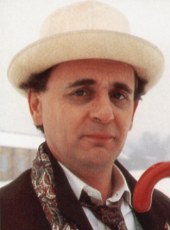 | | The Seventh Doctor |
|
| 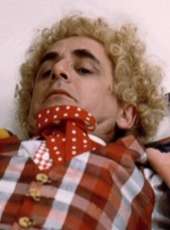 | | The Sixth Doctor |
| | | | |
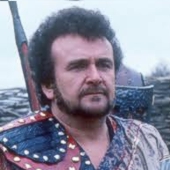 | | Sabalom Glitz |
|  | | Melanie Bush |
|  | | Ace |
| | | | |
|
On Release | | The Collection Season 24 Limited Edition Blu-Ray Cover |

VIDEO |
| | 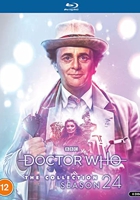 | | The Collection Season 24 Standard Edition Blu-Ray Cover |

VIDEO |
| | | | |
Magazines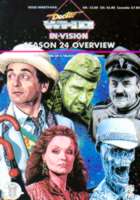 | | Doctor Who CMS Magazine (In Vision): Issue 95: Season 24 Overview |
|  | | Doctor Who Magazine - Preview: Issue 128 |
|  | | Doctor Who Magazine - Episode Guide: Issue 162 |
| 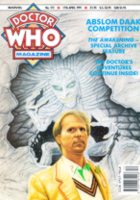 | | Doctor Who Magazine - Episode Guide: Issue 172 |
| | | | |  | | Doctor Who Magazine - Countdown to 50: Issue 454 |
|
|
|
|
| |
| |
|
| |
| |
|
| Doctor Who is the copyright of the British Broadcasting
Corporation. No infringements intended. This site is not endorsed by the BBC or
any representatives thereof. |
|